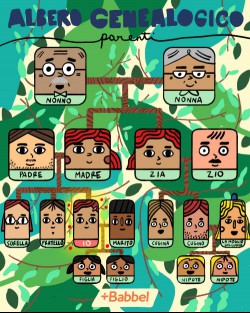Family is a pretty big deal in Italian culture. And that’s not to suggest that it’s not a big deal in every other culture. But in contrast to American norms, Italians stick very closer together. Though this is becoming more and more acceptable in the United States, it’s not uncommon at all for Italians to live with their parents until they’re in their late 20s. And don’t even go there when it comes to dissing someone’s ancestry unless you’re really looking for a fight. If you’re a student of the language, you won’t get very far without learning to name members of the family in Italian.
If you’re familiar with other Romance languages, then you’ll probably find this list fairly intuitive to navigate, but do note that most of these terms are fairly gendered, i.e. there are different ways to refer to your cousins depending on their gender.
One other special quirk to note: the word for grandson and nephew (and by extension, granddaughter and niece) are the same. Oh, and watch out with il fratellastro — this can mean both “half-brother” and “stepbrother” in English!
Here are some terms you’ll need to discuss family in Italian. Just click the play button to hear how they’re pronounced by a native speaker.

Essential Vocab For Family In Italian
the family — la famiglia
the relatives — i parenti
the extended family — i parenti lontani
the descendant — il discendente
the ancestor — l’antenato
the parents — i genitori
the mother — la madre
the father — il padre
the children — i figli
the daughter — la figlia
the son — il figlio
the brother — il fratello
the sister — la sorella
the siblings — i fratelli
the stepchild — il figliastro
half-brother — il fratellastro
the foster parents — i genitori affidatari
the guardian — il tutore
the grandmother — la nonna
the grandfather — il nonno
the grandson — il nipote
the granddaughter — la nipote
the nephew — il nipote
the niece — la nipote
the aunt — la zia
the uncle — lo zio
the cousin — il cugino (m.) / la cugina (f.)
the parents-in-law — i suoceri
the great-grandparents — i bisnonni
the second cousin — il cugino di secondo grado